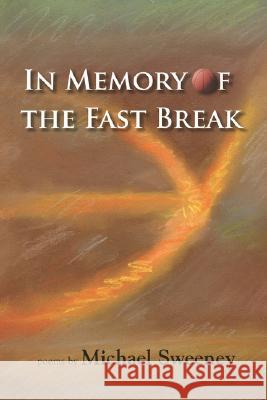In Memory of the Fast Break » książka
In Memory of the Fast Break
ISBN-13: 9781891386718 / Angielski / Miękka / 2008 / 84 str.
Mike Sweeney delivers hard-hitting, power-packed poems that are apocalyptic in their vision of a world gone wrong, a broken world in which "pipelines explode in Iraq & Babylonian artifacts/ litter the promenades." His heaped-up images plunge the reader into toxic skies, turnpike jazz, and the pain that comes from the knowledge that "no matter who you ever were they get you in the end." Yet there is, throughout, the energy and saving power of language, the power that enables you to "damn near levitate."
Nicholas Rinaldi, author of Between Two Rivers, The Jukebox Queen of Malta, Bridge Fall Down, and The Luftwaffe in Chaos, Professor Emeritus, Fairfield University
.steady, grounded, human, subtle, sane. He's a big guy & a good man.
Allen Ginsberg
If Gerard Manley Hopkins were to wax poetic on Michael Jordan, the poems might look like Mike Sweeney's. Not only has Sweeney found a voice, he has invented a form all his own. Read In Memory of the Fast Break aloud. It's beautiful - to eye and ear Fearless, learned, muscular, musical, walloping, and possessed of soul and gravitas, this poetry offers lucid unsentimental reportage on a world simultaneously sumptuous and bitter, luminous portraiture of human flesh engaged in the sometimes ludicrous, sometimes heroic quest for some semblance of a physical or metaphysical personal best, and expansive heroic rhythms which are sorely missing from most contemporary verse. Sweeney writes about politics, rock-n-roll, sports, and the New England and Irish culture that made him what he is today: author of In Memory of the Fast Break, one of the very best collections of contemporary verse I've ever laid eyes on.
Michele Madigan Somerville, author of Wisegal (Ten Pell Books) and Black Irish
Mike Sweeney's poems are reverberating elegiac celebrations in which what we have all lost - the music of the 60's and 70's, innumerable basketball and football games, our youth, our wars - returns, stark and triumphant. The present collapses into the past, which also collapses, but then reforms via breathless rushes of word hunks that capture an authentic American experience that more conventional grammar and less impetuous diction would betray. Ginsberg howls and Frost ruminates throughout the volume to be sure, but through an original, haunting, and exuberant voice.
Sidney Gottlieb, Professor of Media Studies, Sacred Heart University











